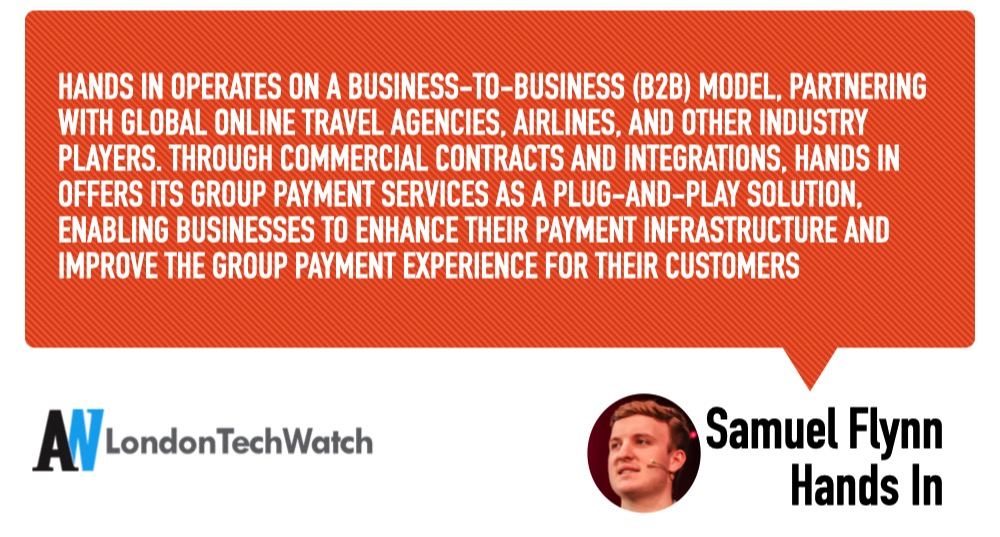Most commonly “social commerce” refers to the use of social networks as a distribution platform to facilitate e-commerce purchases. However, not much attention has been paid to groups that make purchases online. Hands In is a payment infrastructure platform that allows groups to make purchases online at checkout with individual payments. Typically, one individual has been tasked with laying out the cash for purchases for things like travel or gifts and then is burdened with the task of collecting from their friends. Hands In allows groups to make purchases, either broken down equally or as individually, during the checkout process, and the transaction is only completed after all parties have paid. The company is concentrating its efforts on the tourism/travel sector with millennials and Gen Z, who tend to travel in groups of three or more. For merchants, it’s a seamless plug-and-play integration that drives incremental revenue while making the checkout experience more convenient for consumers.
London TechWatch caught up with Hands In Cofounder and CEO Samuel Flynn to learn more about the business, the company’s strategic plans, latest round of funding, which brings the company’s total funding raised to £700K, and much, much more…
Who were your investors and how much did you raise?
Hands In successfully attracted investment from leaders in key payment corporations, including GoCardless, Thredd (formerly GPS), Elavon, FIS, Pay.com, PayU, Curve, and Free Trade. In total, Hands In raised $550K in funding to support the acceleration of its commercialization efforts. The funding round can be categorized as a seed round, which typically represents the initial round of funding for early-stage startups.
Tell us about your product or service.
Hands In offers an innovative group payment solution that revolutionizes the way groups pay together online. The platform enables customers to split the cost of their purchases at checkout, either equally or by item, eliminating the need for one person to upfront the entire bill. Through Hands In, all group members can participate in the transaction simultaneously, with no money taken until everyone has confirmed their participation.
What inspired the start of Hands In?
 Hands In was inspired by a real-life experience I had during my time at University. Faced with the challenge of splitting a large ticket purchase among a group, I recognized the need for a solution that would enable seamless group payments at checkout.
Hands In was inspired by a real-life experience I had during my time at University. Faced with the challenge of splitting a large ticket purchase among a group, I recognized the need for a solution that would enable seamless group payments at checkout.
How is it different?
Hands In stands out by providing a unique solution that allows customers to split the cost of their purchase at checkout. Unlike traditional payment methods that require one person to upfront the entire bill, Hands In allows all group members to contribute simultaneously, reducing failed transactions and improving the overall payment experience.
What market are you targeting and how big is it?
Hands In primarily targets the tourism sector, where group purchases are prevalent. The company recognizes the significant market potential, as 59% of purchases made by Gen Z and Millennial travellers are in groups of three or more. This indicates a substantial market opportunity for Hands In to revolutionize the way groups pay together online.
What’s your business model?
Hands In operates on a business-to-business (B2B) model, partnering with global online travel agencies, airlines, and other industry players. Through commercial contracts and integrations, Hands In offers its group payment services as a plug-and-play solution, enabling businesses to enhance their payment infrastructure and improve the group payment experience for their customers.
How are you preparing for a potential economic slowdown?
Hands In is focused on providing value to its clients and customers, even in challenging economic conditions. By offering an innovative and cost-effective solution that drives incremental sales for retailers and reduces e-commerce friction, Hands In aims to continue delivering tangible benefits and maintaining its competitive advantage.
What was the funding process like?
The funding process for Hands In involved attracting investment from industry heavyweights in key payment corporations. By showcasing the unique value proposition of its group payment services, Hands In successfully completed a $550k funding round, enabling the acceleration of its commercialization efforts.
What are the biggest challenges that you faced while raising capital?
During the capital raising process, Hands In encountered challenges typically associated with early-stage start-ups. These challenges included showcasing the potential of its solution, overcoming investor scepticism, and differentiating itself from competitors. However, the strong value proposition and experienced team helped overcome these challenges and secure funding.
What factors about your business led your investors to write the check?
Investors were attracted to Hands In due to several factors, including its innovative approach to solving a recognized problem in the market, the potential for significant market penetration within the tourism sector, and the experienced team behind the company as well as many commercial contracts signed by global online travel agencies, airlines, and PSP aggregators. The simplicity and ease of integration of Hands In’s solution also appealed to investors, as it addressed customer needs and provided value to operators and merchants.
Investors were attracted to Hands In due to several factors, including its innovative approach to solving a recognized problem in the market, the potential for significant market penetration within the tourism sector, and the experienced team behind the company as well as many commercial contracts signed by global online travel agencies, airlines, and PSP aggregators. The simplicity and ease of integration of Hands In’s solution also appealed to investors, as it addressed customer needs and provided value to operators and merchants.
What are the milestones you plan to achieve in the next six months?
In the next six months, Hands In aims to focus on supporting its global enterprise clients and payment partners, leveraging the funding received to drive the company’s growth. Additionally, Hands In plans to broaden its appeal into new use cases, develop new products and services, and continue expanding its market presence.
What advice can you offer companies in London that do not have a fresh injection of capital in the bank?
For companies in London or any other location facing a lack of fresh capital, it’s crucial to focus on delivering value to customers and clients through innovative and cost-effective solutions, as the best source of funding is customer revenue. By continually improving and differentiating their offerings, businesses can enhance their market position, attract potential investors, and explore alternative funding options such as grants, loans, or strategic partnerships.
Where do you see the company going now over the near term?
Over the near term, Hands In aims to capitalize on its funding and partnerships with many global online travel agencies, airlines, and payment providers.






